Net migration into UK up by more than 38% to 243,000
- Published
Immigration Minister James Brokenshire described the effort to cut net migration as "challenging"
Net migration into the UK increased by more than 38% to 243,000 in 2013-14, government statisticians have said.
EU citizens - including an increased number from Romania and Bulgaria - accounted for two-thirds of the growth from the previous figure of 175,000.
Prime Minister David Cameron said his target of reducing net migration below 100,000 could still be achieved.
Separate figures showed over 25% of births in England and Wales last year were to mothers themselves born abroad.
There was also a rise in the proportion of people in the UK who were born overseas.
Emigration 'stable'
According to the migration figures from the Office for National Statistics, external, a total of 560,000 immigrants arrived in the UK over the 12-month period to March, while an estimated 316,000 people left.
There was an increase in people migrating for work, to 228,000, while 177,000 arrivals were students. An increased number came to the UK to join family members.
For the first time in nearly three years, the number of people migrating to the UK from outside the EU increased, to 265,000.
All the figures are for the 12-month period up to March.

Analysis
Dominic Casciani, Home affairs correspondent
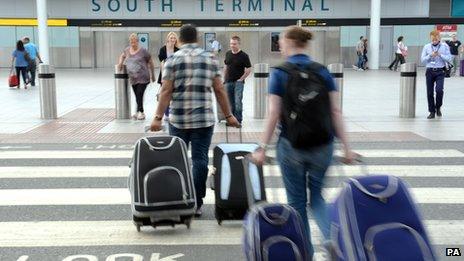
Whatever you think of the figures, today's migration statistics are part of the story of an open market economy in a globalised world.
Every year for the past 20, more people have been arriving in the UK than leaving. The reasons for those movements are complex and have regularly changed.
The key factors were once students or those seeking refuge.
Today it is about work - and the attraction of the open British economy where businesses can recruit from a continental marketplace.
Ministers have restricted immigration from outside the EU - but they have no power to stop the freedom of movement for work inside the club.
And so, as the British economy grows faster than other parts of Europe, workers will continue to arrive - and the net migration target moves further and further out of reach.

The ONS said the increase in overall net migration was "statistically significant", meaning it is "very likely to reflect real changes in migration patterns".
Long-term emigration was "relatively stable", it added.
The number of migrants from Romania and Bulgaria increased from 12,000 to 28,000 over the period. Employment restrictions on citizens of the two countries were lifted in January.
Mr Cameron has previously pledged to reduce net migration to tens of thousands by 2015.
He told BBC political editor Nick Robinson he did not accept the target was impossible because net migration had been at that level in the 1980s, when there were no "draconian controls".
"I have done more than any previous prime minister to bring in controls", he said, including closing "bogus" colleges and limiting non-EU migration.
'Grand promises'
Immigration and security minister James Brokenshire acknowledged hitting the target would be "challenging" because of the increase in migration from inside the EU.
Ministers have no powers to stop the free movement of European workers.
Mr Brokenshire added: "Uncontrolled, mass immigration makes it difficult to maintain social cohesion, puts pressure on public services and forces down wages. That's why our focus remains on controlling migration at sustainable levels."
But shadow home secretary Yvette Cooper said: "David Cameron made such grand promises - no ifs, no buts - he'd meet his net migration target.
"These figures show it's in tatters. It's a really big problem if there's such a gap between the rhetoric and the reality because it undermines public confidence in the whole system."
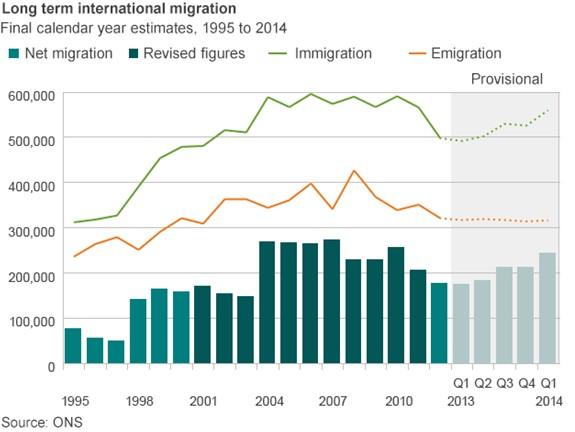
Note: Q1 2013 onwards shows provisional rolling quarterly estimates
The Oxford Migration Observatory said the latest figures made it "effectively impossible for the government to achieve its target by the end of this Parliament without radical measures".
Pressure group MigrationWatch UK said the levels of net migration were "not sustainable".
The group said: "It will put huge further strain on our infrastructure, housing and school places."
UKIP MEP Steven Woolfe said the government was not "listening to the people". He said the levels of immigration were "driving down wages" and causing "overcrowding at schools".
At the same time as the immigration statistics were released, the ONS published figures showing, external 12.4% of the UK's "usual population" in 2013 were born abroad - an increase from 8.9% in 2004.
There was also an increase in the number who had non-British nationality, from 5% to 7.8%.
The ONS also said, external that 26.5% of births in England and Wales last year were to mothers who were themselves born outside the UK, up from 25.9% in 2012.
- Published28 August 2014
- Published28 August 2014
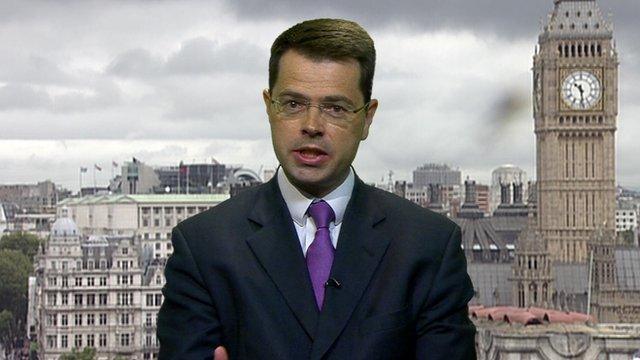
- Published14 May 2014
- Published14 May 2014
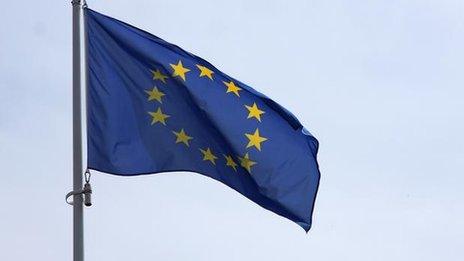
- Published14 May 2014
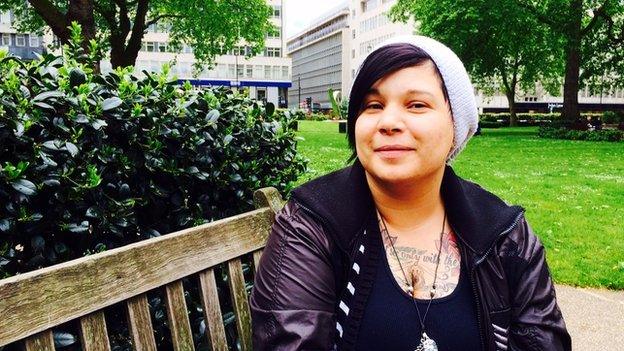
- Published14 May 2014